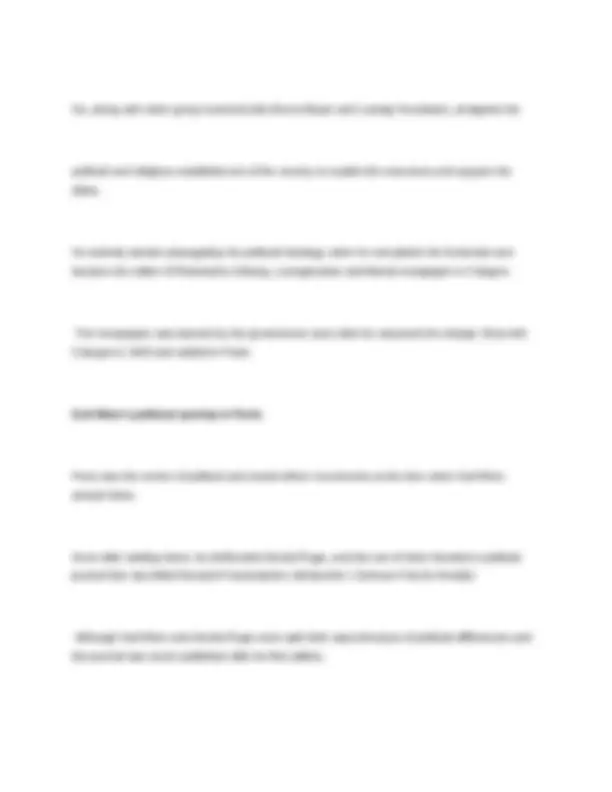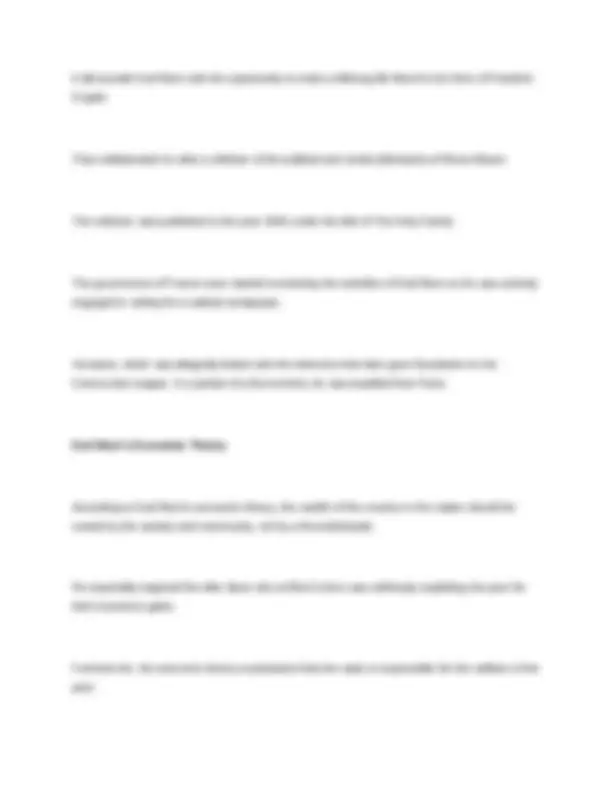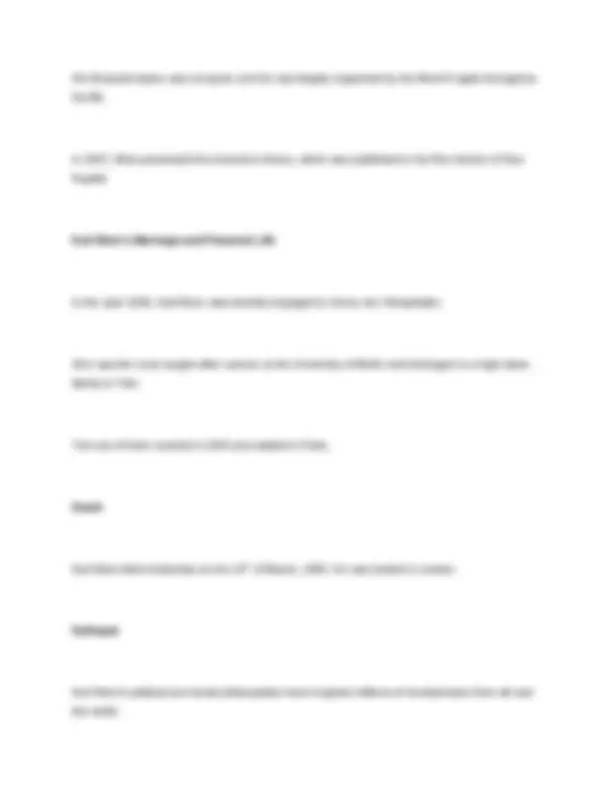







Study with the several resources on Docsity

Earn points by helping other students or get them with a premium plan


Prepare for your exams
Study with the several resources on Docsity

Earn points to download
Earn points by helping other students or get them with a premium plan
Community
Ask the community for help and clear up your study doubts
Discover the best universities in your country according to Docsity users
Free resources
Download our free guides on studying techniques, anxiety management strategies, and thesis advice from Docsity tutors
An in-depth look into the life and works of karl marx, a controversial and influential figure in world history. From his early life in prussia to his higher education in bonn and berlin, this document explores marx's intellectual development and his political activism. It also delves into his economic theories, his time in paris, and his most famous work, the communist manifesto.
Typology: Study notes
1 / 9

This page cannot be seen from the preview
Don't miss anything!






Karl Marx: The Man Who Challenged Capitalism Karl Marx is one of the most influential personalities of all time. His theories and philosophies have changed the lives of millions of people across the globe. He is a controversial figure among historians and is considered a hero or messiah by some yet a villain by others. Early Life of Karl Marx Karl Heinrich Marx was born in the house of a successful lawyer Heinrich Marx in the year 1818 in Trier, Prussia. Karl's father was an admirer of the works of Kant and Voltaire, and he worked hard for political and social reforms in Prussia. His mother, Henrietta Marx, was a housewife, and Karl had 9 siblings. Karl Marx had Jewish ancestry,
but his father Heinrich converted to Christianity in the year 1816, just 2 years before Karl's birth. He was baptized along with his others siblings when he was 6 years old. Karl's Early Education Karl Marx's intellectual capabilities never came into the spotlight in his school days. He was rather considered a mediocre student. He got his early education at home. At 12 years of age, he was admitted to the Jesuit High School in Trier. He stayed there from 1830 to 1835. The principal of the school was Karl's father's friend. He was a liberal and Kantian whose philosophical approach had earned him great respect. But he was not liked by the authorities, and the Jesuit High School was raided in the year 1832, which deeply influenced young Karl's mind. Karl's Higher Education
He, along with other group members like Bruno Bauer and Ludwig Feuerbach, arraigned the political and religious establishment of the country to exploit the resources and support the elites. He actively started propagating his political Ideology when he completed his Doctorate and became the editor of Rheinische Zeitung, a progressive and liberal newspaper in Cologne. The newspaper was banned by the government soon after he assumed the charge. Marx left Cologne in 1843 and settled in Paris. Karl Marx's political journey in Paris Paris was the centre of political and social reform movements at the time when Karl Marx arrived there. Soon after settling there, he befriended Arnold Ruge, and the two of them founded a political journal that was titled Deutsch-Franzosische Jahrbucher ( German-French Annals). Although Karl Marx and Arnold Ruge soon split their ways because of political differences and the journal was never published after its first edition,
it did provide Karl Marx with the opportunity to make a lifelong life friend in the form of Friedrich Engels. They collaborated to write a criticism of the political and social philosophy of Bruno Bauer. The criticism was published in the year 1845 under the title of The Holy Family. The government of France soon started monitoring the activities of Karl Marx as he was actively engaged in writing for a radical newspaper, Vorwarts, which was allegedly linked with the elements that later gave foundation to the Communist League. In a period of a few months, he was expelled from Paris. Karl Marx's Economic Theory According to Karl Marx's economic theory, the wealth of the country or the nation should be owned by the society and community, not by a few individuals. He especially targeted the elite class who at Marx's time was ruthlessly exploiting the poor for their economic gains. Furthermore, his economic theory emphasized that the state is responsible for the welfare of the poor.
The central committee of the Communist League urged Karl Marx and Engels to write Manifest der Kommunistischen (Manifesto of the Communist Party). Karl Marx published his most famous work, "The Communist Manifesto," in 1848. It was such a huge success that he was deported from Belgium by the government in the year
He returned to France to help the socialists in bringing a revolution, but he was soon expelled from there too. He tried to went back to his hometown Prussia, but he was not allowed to enter. He went to London, where he was allowed to live till his death. Karl Marx in London Karl Marx was warmly welcomed by the socialists in London. He helped the socialists find the German Worker's Educational Society and a new headquarters for the Communist League. He remained the correspondent of the New York Daily Tribune from 1852 to 1862.
His financial status was not good, and he was largely supported by his friend Engels throughout his life. In 1867, Marx presented his economic theory, which was published in the first volume of Das Kapital. Karl Marx's Marriage and Personal Life In the year 1836, Karl Marx was secretly engaged to Jenny von Westphalen. She was the most sought-after woman at the University of Berlin and belonged to a high-class family in Trier. The two of them married in 1843 and settled in Paris. Death Karl Marx died of pleurisy on the 14th^ of March, 1883. He was buried in London. Epilogue Karl Marx's political and social philosophies have inspired millions of revolutionists from all over the world.